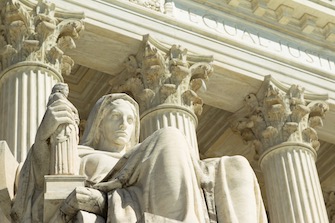In Commil USA, LLC v. Cisco Systems, Inc. (S. Ct. 2015), the Supreme Court held that a belief (i.e., mental state) that a patent is invalid (as opposed to a belief of non-infringement) is not a defense to inducement of patent infringement. The Supreme Court also reaffirmed that a belief that the patent is invalid is not a defense to direct patent infringement or contributory infringement.
During litigation, the patent owner has the burden to show that the defendant’s product is infringing the patent’s claims directly or the defendant is indirectly infringing the patent’s claims through the actions of another. To avoid liability, the defendant can raise a number of defenses such as non-infringement and invalidity for failure to meet one of the statutory requirements of the patent act, or invalidity based on the prior art.
In Commil, the patent owner alleged various direct and indirect patent infringement theories. The infringement theory at issue in Commil related to liability for indirect patent infringement, namely, inducement of patent infringement by another. To prove inducement of infringement, the patent owner had to show that the defendant knew of the patent and knew that the acts being induced constituted patent infringement. In response, the defendant raised a defense that since it believed the patent at issue to be invalid, it could not have believed the acts to be infringing since it is axiomatic that one cannot infringe an invalid patent. The patent owner disagreed and argued that invalidity is a separate issue from infringement and that a belief of invalidity has nothing to do with the mental state of the accused infringer as to infringement.
The Supreme Court used this opportunity to reaffirm its holding in Global-Tech that liability for inducement of infringement can only attach if the defendant knew of the patent and knew as well that “the induced acts constitute patent infringement.” Global-Tech affirms that liability for inducement of infringement can be avoided if the defendant did not believe the actions it was encouraging resulted in infringement of the patent. In this case, Commil (patent owner) had argued that liability for inducement of infringement could arise merely by having knowledge of the patent at issue even if the defendant did not know that the acts being induced would result in infringement. The Supreme Court rejected this position that knowledge of the acts was enough as that would have opened up a number of entities to liability for the acts of others as long as they were in some way encouraging such behavior and knew of the patent even if they did not know the acts resulted in infringement. With this opinion, the Supreme Court reaffirmed the Global-Tech holding that the party inducing infringement must have knowledge that the acts it enourages others to take would result in infringement.
The Supreme Court also rounded out the discussion by reiterating that contributory infringement also requires the patent owner to prove that defendant knew its acts were infringing as was previously found in Aro Mfg. Co. v. Convertible Top Replacement Co. (S. Ct. 1964)(Aro II). As such, liability for contributory infringement can also be avoided if the defendant can show that it did not believe its actions would result in infringement by a third party.
In both theories of indirect patent infringement (i.e., inducement of patent infringement and contributory infringement), the patent owner must show that the defendant knew its activities were infringing. If the defendant can prove that it did not have such belief then it is a valid defense to indirect infringement. In Commil, the defendant went a step further and contended that it was not liable for inducement of infringement, arguing that it is axiomatic that one cannot infringe an invalid patent and it had a good faith belief that the patent at issue was invalid. The defendant mixed infringement and invalidity together. In the opinion, the Supreme Court placed a wall between the theories of infringement and invalidity and held that the mental state of the defendant as to the patent’s invalidity has no bearing on whether it thought its acts were infringing.
The Supreme Court in a sense took away one possible defense from defendants to avoid liability under theories of indirect patent infringement, and thus, patents have become more powerful. It appears that it is for this reason that the Supreme Court addresses the issues of how a patent troll might use this decision to its advantage. Patent trolls have been accused of asserting invalid patents against others. As a result of this opinion, defendants have one less defense against allegations of indirect patent infringement by patent trolls which patent trolls may attempt to exploit. To mitigate such possibility, the Supreme Court affirmed that district court judges have the authority and the responsibility to ensure frivolous cases are dissuaded by sanctioning attorneys (FRCP Rule 11) and awarding attorney fees to the prevailing party in exceptional cases (35 U.S.C. 285).

![[IPWatchdog Logo]](https://ipwatchdog.com/wp-content/themes/IPWatchdog%20-%202023/assets/images/temp/logo-small@2x.png)


![[Advertisement]](https://ipwatchdog.com/wp-content/uploads/2024/04/UnitedLex-May-2-2024-sidebar-700x500-1.jpg)
![[Advertisement]](https://ipwatchdog.com/wp-content/uploads/2024/04/Artificial-Intelligence-2024-REPLAY-sidebar-700x500-corrected.jpg)
![[Advertisement]](https://ipwatchdog.com/wp-content/uploads/2024/04/Patent-Litigation-Masters-2024-sidebar-700x500-1.jpg)

![[Advertisement]](https://ipwatchdog.com/wp-content/uploads/2021/12/WEBINAR-336-x-280-px.png)
![[Advertisement]](https://ipwatchdog.com/wp-content/uploads/2021/12/2021-Patent-Practice-on-Demand-recorded-Feb-2021-336-x-280.jpg)
![[Advertisement]](https://ipwatchdog.com/wp-content/uploads/2021/12/Ad-4-The-Invent-Patent-System™.png)






Join the Discussion
3 comments so far.
Anon
May 30, 2015 09:24 amMr. Heller, I would take issue with your view that the end-user is not morally responsible for infringement.
Has the law regarding “use” qualifying infringement been changed? Has the identity of the end-user been added to the law as some type of excuse? If you are “little enough,” do the patent laws no longer apply?
The fact that logistical issues may exist with enforcement of rights is quite separate from the existence of those rights.
You yourself indicate that Congress is considering legislation to prevent end-users from being the object of lawsuits. Until that happens (and the devil will be in the details of such laws), there remains a very real moral responsibility. On other blogs I read your views on infringement as a strict liability offense and agree with that view. I find though that such a view is just not congruent with the views you have expressed here.
Night Writer
May 29, 2015 09:40 am>>All in all, we are witnessing the destruction of the patent system.
I absolutely agree with this. Just unbelievable too that the SCOTUS can write opinions like this with a straight face. They know exactly what they are doing. The know that Alice and this opinion are judicial activism to burn the system down. They know.
Edward Heller
May 29, 2015 09:18 amAs I said earlier, by confirming that the private “reasonable” belief that there is no direct infringement, the Supreme Court as done substantial damage to the patent system, all but eliminating indirect infringement from the law. As observed in the many amicus briefs to the Supreme Court, one can avoid indirect liability simply by paying the price of a defensive opinion. It does not matter whether the opinion is correct, just that it exists.
Unless we legislatively overturn Aro II, and Global-Tech and Commil, patent law is a world of hurt.
Patent owners will have no recourse but to sue end-users who morally are not responsible for the infringement because their infringement is caused by the indirect infringer who has no liability because of the Supreme Court cases. And at the same time this necessity arises, Congress is considering legislation to prevent lawsuits against end-users.
All in all, we are witnessing the destruction of the patent system.